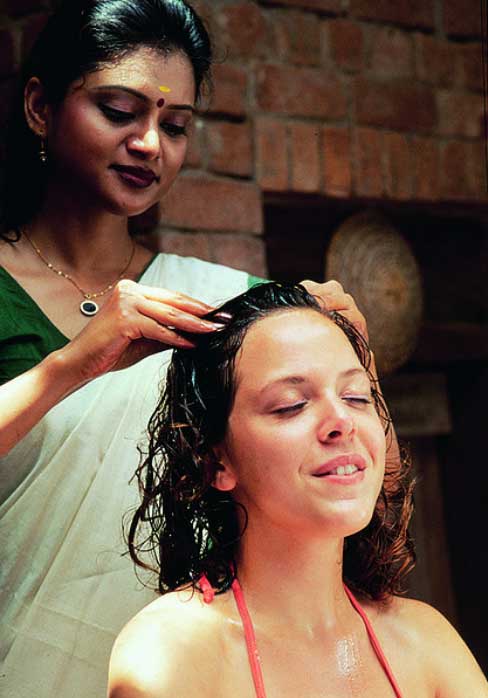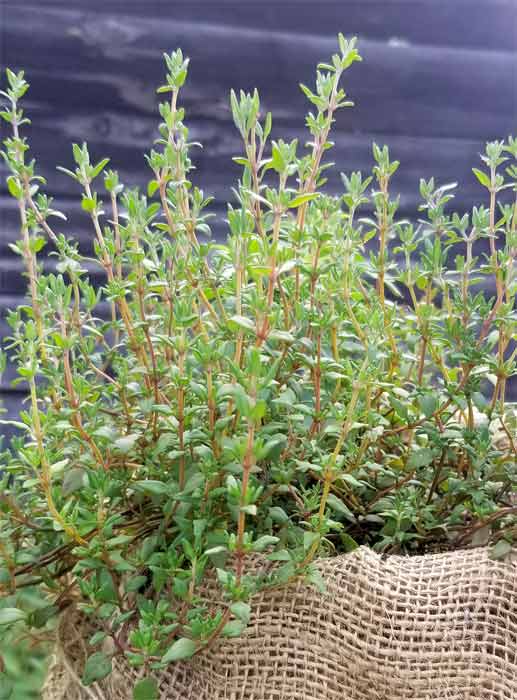Thyme in herbal medicine and aromatherapy

Romans used thyme (Thymus vulgaris) to treat hangovers, and they burned it to purify their homes and temples. People associated thyme with courage, bravery, and strength.
Thyme is a well known culinary herb. It is also useful in natural remedies and herbal medicine.
It is said that regular use of thyme essential oil retards hair loss. Add it to scalp treatments, hair conditioners, and shampoos. Use daily or whenever you wash your hair.
According to Rudyard Kipling (author of The Jungle Book), “The scent of thyme is like the dawn in paradise.”
Thyme is especially suited for soothing deep-seated coughs and lung problems. Use thyme when ever you need an antiseptic, expectorant, antispasmodic, astringent, or diuretic.
Thyme is also good for the digestive system and as a spring tonic.

Thyme is useful in many ways.
For lung problems, use thyme in herbal tea, externally as a warm compress or poultice, and as a steam inhalant.
Thyme is also a remedy for digestive and stomach problems.
Use thyme to stop diarrhea, chills, bed wetting and menstrual pain. Take internally as tea, infusion, syrup, or tincture.
Gargle with thyme
Thyme is used to speed recovery from sore throat. Brew a strong thyme infusion, cool, and use as gargle four or five time a day.
Thyme contains high concentrations of the antiseptic thymol which is the main active ingredient in Listerine mouth wash.
Thyme has strong antiseptic, expectorant, antispasmodic, diuretic, and astringent properties.
An antiseptic is something that kills germs and prevents infection. An expectorant loosens congestion in the lungs. An antispasmodic relieves spasms and cramps. Diuretics increase the flow of urine and reduce swelling. Astringents cause tissues to tighten. Read more about the properties of herbs here.
The science behind thyme
Thyme contains phytonutrients, minerals, and vitamins.
The oil of thyme contains potent flavonoids and antioxidants that fight inflammation and infection.
Thyme is good for the eyes, the skin, and the brain.
The leaves are a good source of potassium, calcium, iron, manganese, magnesium, and selenium.
Thyme has anti-diabetic properties, inhibits dental decay, kills harmful parasites, and helps protect the skin from ultraviolet radiation.

Applications of thyme can help heal external wounds.
Apply thyme essential oil externally as a warm compress to fight infection. Apply to bruises and sprains to increase blood flow to the body's organs and extremities, which speeds healing.
Diluted applications of thyme essential oil helps heal sore muscles and other injuries.
Thyme essential oil is used in the treatments of the respiratory system, the immune system, and as an aid to digestion. Thyme essential oil is also used to fight infection.
Lots of uses for thyme essential oil
It is also a good home remedy when treating:
- Gout
- Rheumatism
- Wounds
- Sores
- Water retention and edema
- Menstrual problems
- Menopausal symptoms
- Chronic candidiasis
- Bad breath
- Body odor
- Fatigue
- Nausea
- Depression
- Colic
- Gas
- Scar tissue
- Oily skin
- Colds and flu
- Poor circulation
- Sore throat
- Sinusitis
- Anorexia
- Cellulite
- Skin problems
- Eczema
- Athlete’s foot
- Dermatitis
- Insect bites
- Stings
- Laryngitis
Healing starts at home.
Brittany Nickerson is a practicing herbalist, health educator and cook. She combines knowledge of nutrition and a passion for using food as medicine with her training in Western, Ayurvedic and Chinese Herbal Medicine. In this video, Brittany talks about thyme and other herbs.
Pain caused by muscle spasms can benefit from the use of thyme essential oil.
Muscle spasms and cramps can be painful. Try using thyme oil to stop them from occurring! Add a few drops of thyme essential oil to a tablespoon of cold-pressed oil and rub gently.
Also use thyme essential oil and gentle massage in the treatment of coughs, muscular aches, and intestinal complaints.
Thyme essential oil is good for arthritis pain.
Mix ten drops of thyme essential oil with a pint of water and use as compress over inflamed joints.
Blend with lavender, sage, or rosemary essential oil for added benefits.
Always dilute thyme essential oil with water or vegetable oil before use. Thyme essential oil may also be added to an herbal bath for relief of arthritis and muscle pain.
Thyme essential oil is an excellent expectorant.
Do you have bronchitis with lungs full of phlegm? Do your lungs feel like they are on fire? Maybe you have a hacking cough. Try using thyme essential oil in chest rubs and poultices when treating bronchitis and lung problems.
Breathing the vapors can really help loosen congestion and relieve burning sensations in the lungs.
Make an effective chest rub or massage oil by combining 10 drops of thyme essential oil with half a cup of almond oil (or olive oil). Massage chest area with gentle circular motions.
Add hyssop or peppermint essential oil for best results.
Thyme essential oil in aromatherapy
In aromatherapy, thyme essential oil is used to strengthen the mind and calm the emotions.
Thyme essential oil is cleansing and can be used as a disinfectant.
It blends well with bergamot essential oil, grapefruit essential oil, lemon essential oil, lavender essential oil, rosemary essential oil, juniper essential oil, and pine essential oil.
The skin can benefit from thyme essential oil.
Dilute thyme essential oil with water and use as a toner to tighten mature skin.
It may also be added to lotions and used to help prevent acne outbreaks.
Thyme essential oil is useful in the treatment of toenail fungus.
Mix thyme essential oil with tea tree oil and dilute with water before using on toenail fungus and athlete's foot.
Apply often throughout the day and before bed for faster results. This treatment takes patience so don’t give up. Give it two or three months before results are really noticeable.
More about thyme
Thyme is a summer herb producing stronger fragrance when the sun is hottest. The essential oil is distilled from the flowering tops.
Thyme is from the same family as sage and is a strong stimulant. It is sometimes used to increase the appetite and is good for those that have been seriously ill.
In other cultures, thyme essential oil is used to treat stubborn cases of worms, since it stimulates the digestive tract.
Like rosemary, thyme is also known to stimulate the brain and improve memory.
Thyme repels insects.
Thyme essential oil can be used to keep away insect pests such as mosquitoes, fleas, lice, bed-bugs, beetles, and moths. Add to body lotions or make a spray by diluting the oil with water.
Shake well before use. Spray on all exposed skin except hands and face before going outdoors if bugs are a problem where you live.

There are many types of cultivated thymes
Thyme comes in many flavors and varieties including orange, ginger, and caraway scented.
All thymes are wonderfully aromatic.
Growing your own thyme
Thyme grows best in full sun and well drained soil. Here in the mountains of north Georgia, thyme loses its leaves during the coldest months of winter (where temperatures drop to below freezing). It looks dead, but it isn't. Your thyme will grow new stems and leaves in mid-spring.
In my herb beds, I put pebbles around the thyme and other Mediterranean herbs. The rocks get warm and reflect heat back up onto the plants, which they seem to love. The pebbles also help to maintain moisture and keep the soil cool.
Thyme grows to a height of twelve inches, with woody twig like stems and tiny oval leaves. Creeping or wild thymes may have a more delicate appearance.
Clip often to encourage new growth. Thyme also grows well in a pot.
Propagate thyme plants by divisions, stem cuttings, or root cuttings.
Thyme should be propagated by cuttings or division since seeds are difficult to germinate.
Thyme should be harvested before and during flowering. Store dried thyme in a cool, dark, dry place.
*Do not use thyme essential oil if you have high blood pressure. Do not use thyme essential oil during pregnancy. Avoid thyme essential oil when pregnant as it is a uterine stimulant. Thyme oil can irritate mucus membranes so dilute well before use. Keep all essential oils away from the eyes. Do not take essential oils internally without consulting a qualified professional.
Always dilute essential oils with good carrier oil and test on small area of skin before use. Always consult with a healthcare professional before using any herbal remedy especially if pregnant, nursing, or taking other medicines.
Sources:
https://www.ncbi.nlm.nih.gov/pmc/articles/PMC9147557/
Blessings to you and yours!
Thanks so much for reading my blog. Jan.

*Note - the information on this website has not been evaluated by the Food and Drug Administration.
© 2005-2024 website design and content by Janice Boling